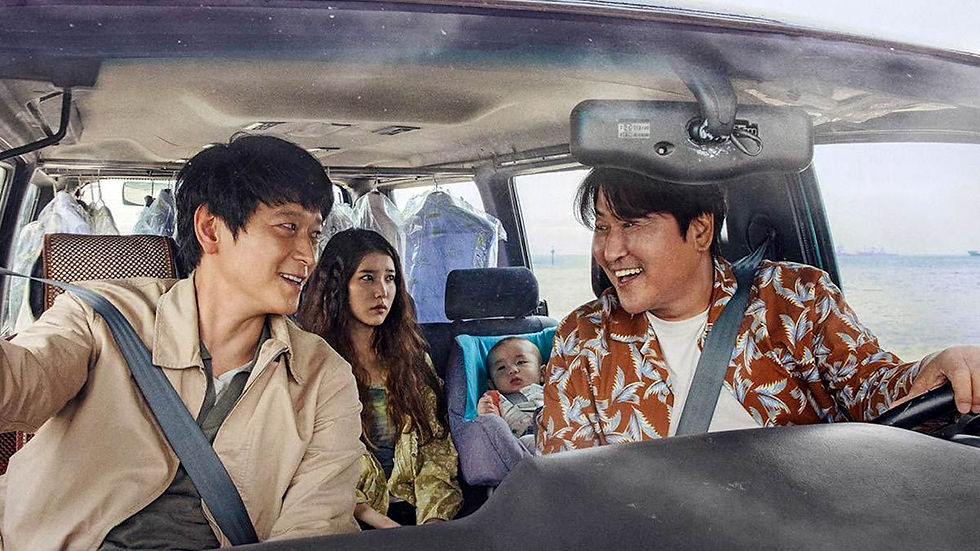A Brief Analysis of Three Films by Hirokazu Kore-Eda
- Mackenzie Glover

- May 5, 2025
- 4 min read
Updated: Jan 2
(This was a university submission by me that I thought I'd share here)

Hirokazu Kore-Eda is a Japanese filmmaker who inspires me greatly. He makes beautiful films around characters that are flawed, genuine, and most importantly human. All of his films offer glimpses into different aspects of real life, and they showcase the wide array of emotions we can all feel. Therefore, I am going to analyze Shoplifters (2018), Broker (2022) and Monster (2023). These three films are all distinct in their own way, but they inspire me all the same because of their raw nature. His focus on intimate human connections and nuanced storytelling has greatly influenced my approach to crafting emotionally grounded narratives.
Kore-Eda’s style when it comes to the technical aspects of his films is generally quite muted. He doesn’t do anything flashy or crazy, as he instead focuses on the writing, pacing and characters. His films never feel boring, even if they have little to no action throughout. He features lots of wide shots of his locations and it compliments the calming nature of his plots. He also uses lots of soft pianos and guitars to create a small and limited soundscape, which again compliments the story while also not overshadowing it. He doesn’t want to distract us with lots of extra pieces to his otherwise simple puzzle, which is the human drama. All of this will reflect in my future films, and it can be seen in quite a few of my already written scripts. I enjoy writing small-scale character studies around various people, and trying to make them memorable. I also enjoy the slightly weird and bizarre nature of Kore-Eda’s scripts and it’s something I want to recreate in future projects. It never gets in the way of the script but it leads to a film with a unique tone and a plot that doesn’t bore you. He can center his films around something slightly strange, or even illegal, but does it so casually for the audience to be intrigued. I love a slightly off-center movie that can be strange but not enough to distract you from the human story at the center. I’m also a big fan of his smaller budgets. He doesn’t bring out expensive and famous cast members or build lavish, huge sets. He crafts a film with a good script, more honest performances from the cast and locations that are real and serve a purpose.

The first film I will discuss is his 2018 Palme D’or winning Shoplifters. It’s about a group of disadvantaged people who become a family, not bonded by blood. This was the film that made me dive deeper into making small scale and human stories. The fact that the family wasn't related but it didn’t matter was such a touching emotional center and it added so much emotion. I was amazed by the fact there were very few “exciting” moments but I stayed invested throughout the entire runtime. All of the characters bounced well off each other and I loved the connections they made. They were flawed, they knew it, and they didn’t care. The ending was brilliant too, as it wasn’t a huge, shocking reveal but a small line given by a character, acknowledging that he has found his family. Morally ambiguous characters are a staple of Kore-Eda’s filmmaking and it’s on full show in Shoplifters.

The second film, Broker, was another film that features morally ambiguous characters around a plot that is slightly off-center. We witness two men take a baby from a woman who doesn’t want it, and try to sell it to a family that does. The duo starts to grow as the baby’s mother joins the group and an orphaned friend tags along too. It’s a very wild idea for a plot but it never strays from the genuine and beautiful message of people finding others in a world that doesn’t want them. His narrative here continues to impress me, while his technical aspects remain similar to that of Shoplifters. Lots of simple shots, including lots of wide angles, and a lack of a flashy, expensive soundtrack, just soft pianos and guitars.

Finally, Monster is a brilliant film that dives into different perspectives and pre-made conceptions we can have on other people. We learn about a kid being bullied by a teacher, so naturally the mother intercepts and as the audience we have nothing but disgust for the teacher. As the narrative progresses we see the teacher’s side of things, which opens up the narrative while also shifting our negative and positive attitudes to other characters, until the final act when we learn the entire truth. Again, this is a film with very limited action but lots of dialogue alongside beautiful imagery of youth and love. This film in particular is set out in such a unique way with its changing perspective, and it uses a single image of the nighttime skyline to signify this change.



Comments